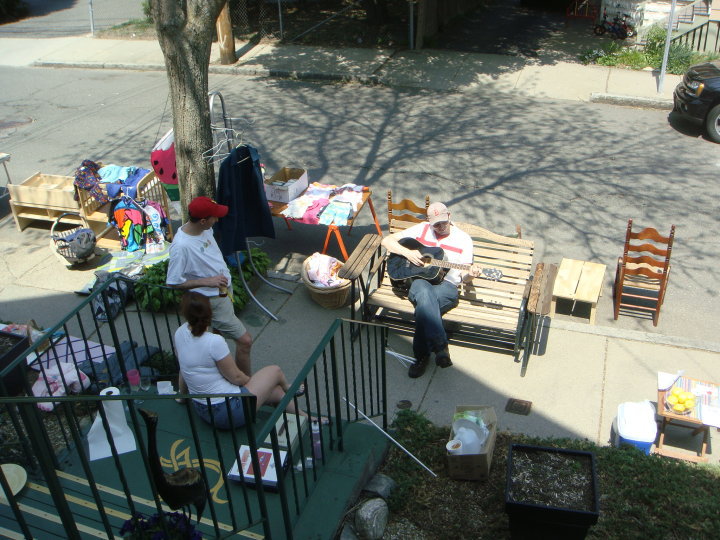One reason my wife & I continue to rent and have failed to buy somewhere else is because we love our street so much it drains our enthusiasm for moving. We just love the way the pavement looks. And the lamp-posts are just fabulous!
The multi-neighbor yard sale we held today is one reason. This was our fourth and it was our most successful, financially: over $700 between five families! It was also the most gorgeous day for it, and we were all present, and all in great spirits! Even my guitar playing, as poor as it is, added a little something (I only know House of the Rising Sun, some 12-bar blues (E/A/B7) and I’m learning Walk the Line):

Photo: by my neighbor Andrew from his porch
I know some of my neighbors better than others. [I’m going to use fake names here, just because.] Adrienne and Keith over the road have two children similar ages to ours so we’ve gotten to them best over the last 6 years. Below them in the two-family house are Susan & Derek. Directly opposite are Gavin and Andrew, and their lodger Sarah. Below them are Maureen and her mom Margaret. These were all involved in the yard sale. Then next door and a few doors down are Rich, Andrea, John, Bill, Doreen.
Relational Proximity Dimension #3 is “Multiplexity”. My relationship with someone is better and healthier if I interact with them in two or three different contexts than if we only interact in one. This is, essentially, about my knowledge of the other person.
Arguably, I have the same directness with the latter group (Rich etc.) as with the former (Adrienne etc.); we encounter one another face to face and are on very friendly terms. And with them all we’ve talked about weather, jobs, backgrounds, the Red Sox, local history, family etc. But because we organized and ran a yard sale, my relationship with the individuals in the former group increased incomparably.
Imagine the richness of knowledge (savoir and connaître) added to our relationships by doing this one thing? Susan buys individual colored stickers for each family, sends copies of yard sale posters to us all, gets a cash till and a book to manage transactions. She’s also a master seller! Derek and I pretty much follow orders, but make wise-cracks while doing so! Gavin & Andrew provide coffee & muffins for everyone when we start at 6.30am; then burgers & hot-dogs at lunch. I provide cream-cheese on toast half way through the morning; then beers later. Gavin puts balloons up in the streets around. Keith charms the buyers with his smile and warmth and conversation. Derek gives us a kids bike that he was going to sell. Keith also fixes up his old, but meaningful, mountain-bike and wrestles over whether to sell it and for how much. I break out in a Johnny Cash. I could go on. And it did, until about 4pm.
That’s it. Just one more context of interaction I’m bursting with the fullness of the relationships. It’s highly unlikely I would have ‘known’ all of that just be talking over the fence or even having dinner together. And now, the “g’morning!”, the “how’s work?”, even if that’s all we do in passing for months, somehow means more and is treasured more because of this May 1st yard sale.
[This is also an example of Dimension #5: Commonality/Purpose. That we engaged in a common and agreed task – and all the trust that goes into accomplishing that, as evidenced above – probably better explains the enormous sense of fulfillment we had at the end, over and above simply getting to know each other better.]